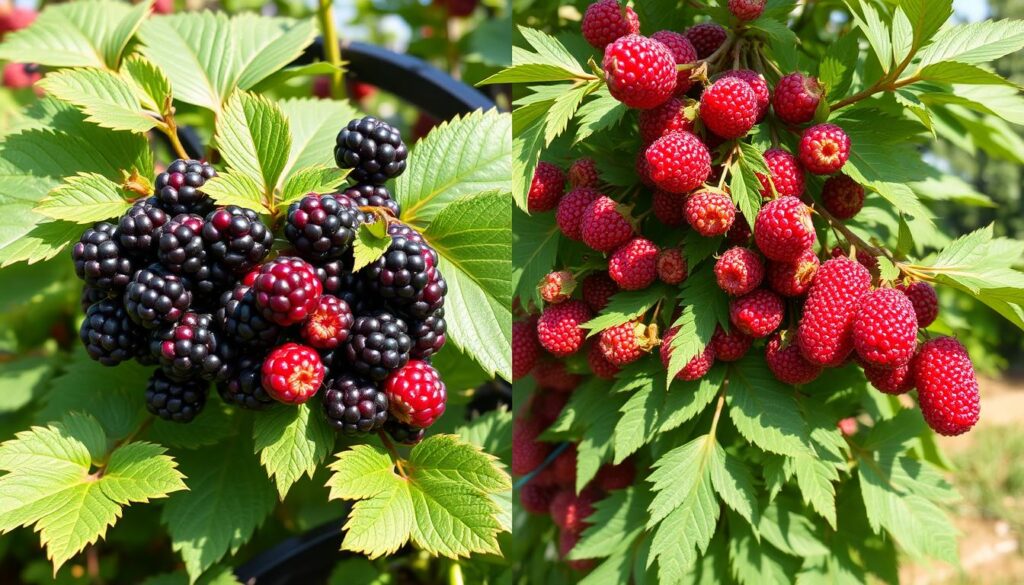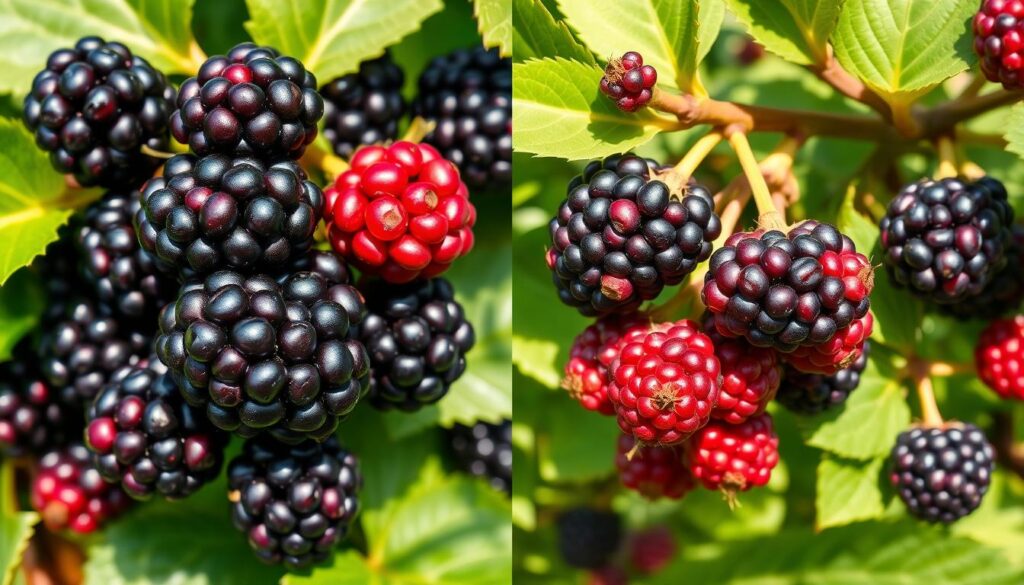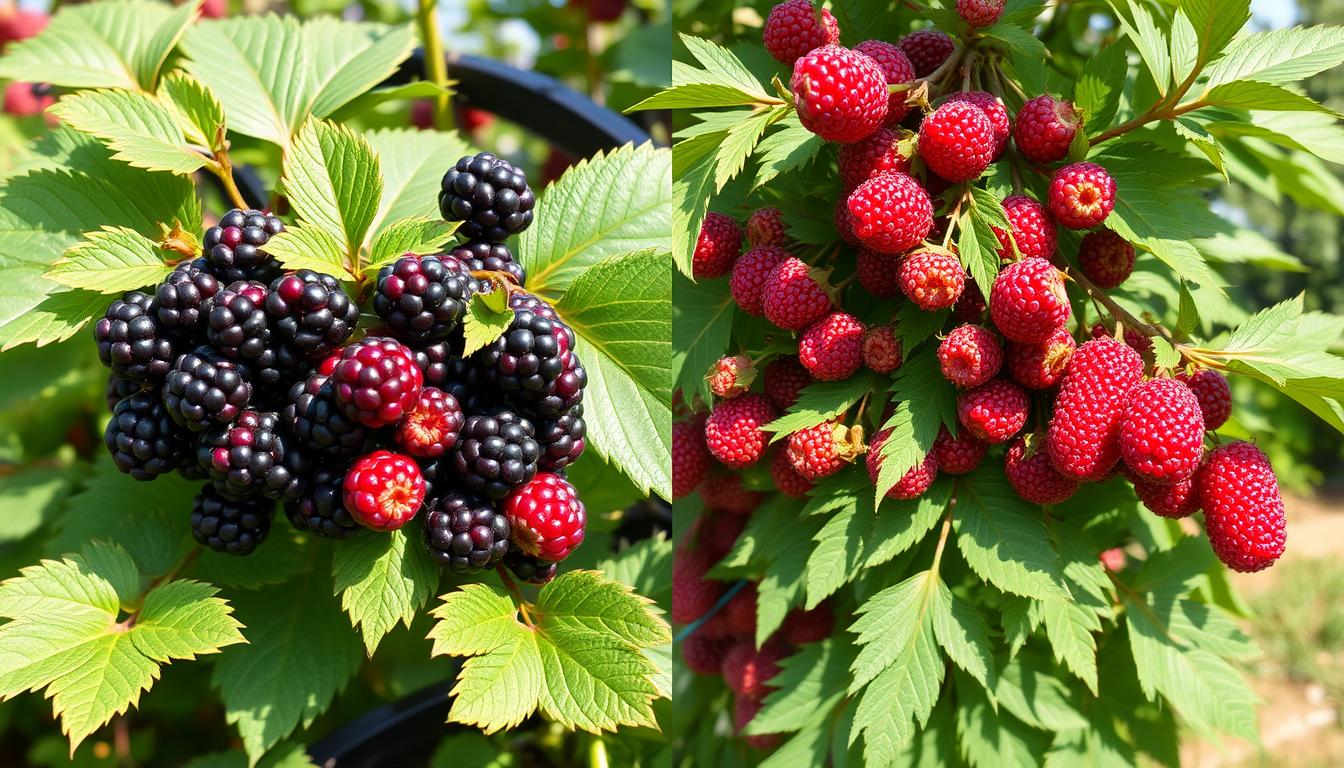Blackberries and mulberries are tasty fruits from different families. Blackberries come from the Rubus genus in the Rosaceae family. Mulberries, on the other hand, are from the Morus genus in the Moraceae family. We’ll look at how they differ in appearance, growth, taste, and nutrition.

Introduction
Blackberries and mulberries are both berries, but they come from different families. Blackberries belong to the Rubus genus in the Rosaceae family. Mulberries, on the other hand, are part of the Morus genus in the Moraceae family.
Blackberries are found in Asia, Europe, and North America. They have been used for food and medicine for centuries. Mulberries have been grown for centuries, with history in ancient China.
Blackberry Overview
There are over 40 species of blackberries worldwide, with the US being a major producer. They are packed with antioxidants, fiber, vitamins, and minerals. Blackberries grow best in mild winters and long summers.
Mulberry Overview
Mulberries are a versatile fruit used in many dishes. They grow on deciduous trees, with the White Mulberry being common. Mulberries have different leaf shapes and ripen from mid-June to mid-July.
Both blackberries and mulberries have been part of our diet for a long time. They are now popular for their taste, health benefits, and nutritional value. The World Health Organization suggests eating at least 400 g of fruits daily to stay healthy.
Blackberry Vs Mulberry
Blackberries and mulberries look similar but are different in many ways. Blackberries grow on bushes, while mulberries grow on tall trees. Blackberries are rounder, and some mulberries can be up to 10 cm long.
Mulberries can be black, white, or red, depending on the type. Blackberries are usually dark purple or black. Also, blackberries don’t have stems when picked, but mulberries do.
| Characteristic | Blackberry | Mulberry |
|---|---|---|
| Plant Type | Prickly bushes | Deciduous trees |
| Maximum Height | Bushes | 80 feet |
| Fruit Shape | Rounder | Can reach 10 cm in length |
| Fruit Color | Dark purple or black | Black, white, or red |
| Stem Attachment | No stem | White or green stem |
Both blackberries and mulberries are not true berries. They are made up of many fruits. Their growth habits, fruit looks, and botanical types are different.

Taste and Culinary Uses
Flavor Profiles and Culinary Applications
Blackberries and mulberries have unique tastes that are great in many dishes. Blackberries are tart and sweet, perfect for topping ice creams and cakes. They’re also great in juices and jams.
Mulberries have a sweet and tangy taste, sometimes with a hint of spice. They’re perfect for making jams and jellies. Mulberries are also used in many berry culinary uses and fruit recipes.
| Blackberry Flavor | Mulberry Flavor |
|---|---|
| Tart, luscious, and delectable | Well-balanced, sweet and acidic |
| Commonly used as a topping and in jams | Commonly used in jams, jellies, and wine |
| Ripest berries are sweet and tangy | Sometimes with baking spice notes |
The unique blackberry flavor and mulberry flavor make them versatile in cooking. They add a special touch to both sweet and savory dishes.
Nutritional Comparison
Blackberries and mulberries have different nutritional profiles. Blackberries have more fiber, vitamins A, E, and K, copper, and zinc. Mulberries, on the other hand, have more sugars, vitamins C and B2, iron, calcium, potassium, and phosphorus.
Both berries are packed with antioxidants like anthocyanins and resveratrol. These help protect against heart disease, cancer, and diabetes. Blackberries are smaller and taste more sour than mulberries.
| Nutrient | Blackberry | Mulberry |
|---|---|---|
| Sugars | 4.88g | 8.1g |
| Fiber | 5.3g | 1.7g |
| Vitamin C | 21mg | 36mg |
| Iron | 0.62mg | 1.85mg |
| Calcium | 29mg | 39mg |
| Vitamin A | 214IU | 25IU |
| Zinc | 0.53mg | 0.12mg |
In summary, both blackberry nutrition and mulberry nutrition have their health benefits. Blackberries are richer in vitamins and minerals. Mulberries, on the other hand, have more sugars and other nutrients. Adding these berry health benefits to your diet can boost your intake of fruit vitamins and minerals.
Conclusion
Blackberries and mulberries may look similar, but they are different fruits. Blackberries grow on prickly bushes and belong to the Rubus genus. Mulberries, on the other hand, grow on trees and are part of the Morus genus.
Blackberries taste sweet and tangy, while mulberries can be sweet or tart. Blackberries are great in desserts like pies and jams. Mulberries are often used in traditional Chinese medicine and as a snack.
Blackberries have more fiber and antioxidants, making them good for you. Mulberries are rich in iron, which is good for people with low iron levels. Knowing these differences helps you enjoy and use these fruits better in your cooking and healthy lifestyle.
Whether you prefer blackberries or mulberries, both are tasty and nutritious. They can add flavor and health benefits to your diet.









